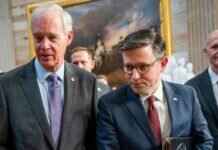After a wild day of trading, the stock market went bananas on Monday when the U.S. and China decided to chill out on their tariffs for a bit. Investors were like, “Phew, finally some good news!” The Dow Jones Industrial Average shot up over 1,100 points, which is, like, a 2.8% increase. After taking a beating earlier in the year, the Dow is now back to square one. It’s not quite where it was back in February, but hey, we’ll take what we can get.
The S&P 500, which is like the stock market’s best friend, also had a good day, adding 3.3%. The Nasdaq, the cool kid in school, soared a whopping 4.4% and is officially in a bull market now. It’s like that kid who was failing all semester but somehow managed to pull off a passing grade at the last minute. Other indicators are hinting that maybe, just maybe, the damage from all these tariffs won’t be as bad as we thought. People are starting to believe that the Federal Reserve might not raise interest rates after all, which is a big deal because, you know, money stuff.
In a joint statement, the U.S. and China were all like, “Let’s ease up on the tariffs, shall we?” The U.S. said they would drop their tariffs on Chinese imports to 30% for a little while, while China would do the same for U.S. imports. It’s a start, but there’s still tension in the air. Prices are still going to go up for stuff coming in from China, so don’t go spending all your money just yet. And let’s not forget about that whole trade imbalance thing that got us into this mess in the first place. It’s not like that problem magically disappeared overnight. But hey, at least the two countries are talking again, right? Who knows, maybe they’ll actually figure things out this time.















